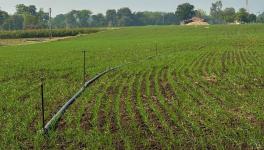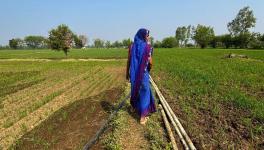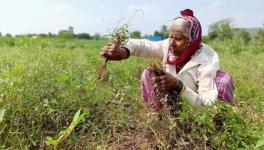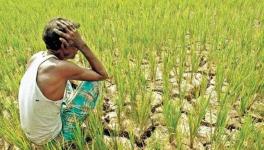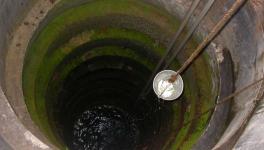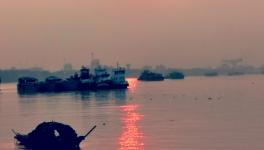#DroughtDistress: Delayed Monsoon Worsens TN's Woes
Image for representational use only.Image Courtesy : Deccan Herald
Tamil Nadu is going through one of the worst droughts the state had ever witnessed, which is being aggravated by the failure of monsoons, the sole source of water in the state. Unlike previous years, this year, the rural areas are also hit hard by water scarcity. According to the Ministry of Jal Shakti (formerly Minister of Water Resources, River Development and Ganga Rejuvenation), "Hydrological drought is best defined as deficiencies in surface and subsurface water supplies leading to a lack of water for normal and specific needs. Such conditions arise even in times of average (or above average) precipitation when increased usage of water diminishes the reserves."
24 Districts Announced Drought Hit
The state government has declared 24 districts as hydrologically drought hit, namely Chennai, Dharmapuri, Krishnagiri, Karur, Salem, Vellore, Tiruchirapalli, Perambalur, Tiruvallur, Namakkal, Virudhunagar, Kancheepuram, Madurai, Dindigul, Erode, Pudukottai, Sivagangai, Thanjavur, Viluppuram, Tiruvannamalai, Ariyalur, Nagapattinam, Cuddalore and Ramanathapuram. They have recorded rainfall in deficit.
In urban areas, the situation is critical, where people are heavily dependent on private water tankers. These tankers collect water from the outskirts of the cities and from villages, where the subsurface water level is drastically declining. They drill bore wells deeper than that of the residents, affecting their bore wells which are only a few hundred feet deep. The people in these areas have objected to the private water tankers and are now barring them from collecting water.
IT Industry, Gated Community Dearth of Water
In many IT firms, which are largely dependent on private water suppliers, water distribution has hit a halt. An IT employee, on condition of anonymity, said, “The companies have restricted the supply of water. In my company there are nine floors, whereas water supply is available in only three floors. So the employees of three floors have to use the facility in one floor. The toilets and bathrooms of six other floors have been locked. The canteens too have started using disposable plates and cups to reduce water consumption. But, whether these items are disposed properly is another issue.”
Also watch: Effective Scientific Methods are Necessary to Tackle Drought, Not Prayers - TNSF
The gated communities too are suffering from severe water crisis. The Chennai Metropolitan Water Supply and Sewerage Board which supplies water to the residences have now adopted new measures. It has turned to online registration for water supply on a first come first serve basis. But the residents allege that they get water only after 20-25 days even when they register for water in the portal. The private water suppliers have increased the cost to almost three times during the last three weeks owing to the demand.
Dams, Lakes Running Dry
Major water sources in Chennai and nearby districts have also dried up. The city is mainly dependent on the two sea water treatment plants and Veeranam lake for clean water now. About 200 million litres of seawater is being treated in these plants daily.
In Chennai, fish in three lakes are reportedly dying en mass due to the scorching heat and pollution. About 50 tons of fish from Ambattur, Korattur and Retteri lakes have died as per local media reports. The natives have been complaining about the fish waste being not disposed properly. The corporation has allegedly been only burying these fish without proper protocol.
Farmers Suffer the Worst
Meanwhile, the continuous monsoon failure has put the farmers in a fix. The drought is being considered as the worst in almost 140 years. As a result, there have been several cases of farmers’ suicide in the past few years, a new and worrying trend in the state. At the same time, the state had witnessed several cyclones in the past few years. Cyclone Vardah devastated Chennai with flood and water logging, while Okhi and Gaja caused extensive damage to the crops of the already suffering farmers.
Also read: Cyclone Gaja: Relief Work Underway, Victims Dissatisfied
Most farmers are also unable to start farming for the next season as most of the dams in the state have dried up. In Virudhunagar district, the condition is so bad that farmers are forced to buy water from private water suppliers to save their crop. People belonging to villages and towns all over the state had laid siege to the highways during the month of May to direct the government’s attention to the conditions of poor water supply.
Delay in Monsoon Enhances Fear
Dr S Janakarajan, a retired professor from Madras Institute of Developmental Studies (MIDS) and an expert on water management told NewsClick, “The monsoon which sets in during the first week of June seems to have been delayed this time. We have no clear information about the onset of the monsoon as of now. In all possibilities, the monsoon might be below normal. For the past 15-20 years, we are only extracting water and not doing anything to recharge the ground water level. The state government is doing all possible things to get water from all possible places instead of thinking about a long-term alternative.”
He also added, “The private water suppliers are exaggerating the water crisis in rural areas by digging bore wells as deep as possible. With no proper regulations available on the depth up to which bore wells can be dug, they are exploiting the situation. This will lead to a situation similar to Plachimada where most of the neighbouring villages went deep into trouble because of the private players.”
State Funds Prove Insufficient
Earlier, the state government had allocated an amount of Rs 158 crore to ensure uninterrupted drinking water supply in the state. An additional Rs 122 crore was also sanctioned to Chennai Metro Water and Rs 36 crore to Tamil Nadu Water Supply and Drainage Board (TWAD) for similar reasons. But the unprecedented heat and drastic decline in ground water level is proving as a hurdle to the government’s plans.
The apathy of the government towards the public and farmers on the issue of regular water supply has left them reeling under crisis. The state government has to undertake positive steps in creating awareness about water harvesting and implementing projects to build check dams and de-silt water bodies to improve the ground water level. Only the proactive steps by the government will ensure that such situations do not arise in the next summer season too.
Also read: Modi vs Farmers: Agrarian Crisis in Tamil Nadu to Reflect in Poll Results
Get the latest reports & analysis with people's perspective on Protests, movements & deep analytical videos, discussions of the current affairs in your Telegram app. Subscribe to NewsClick's Telegram channel & get Real-Time updates on stories, as they get published on our website.









